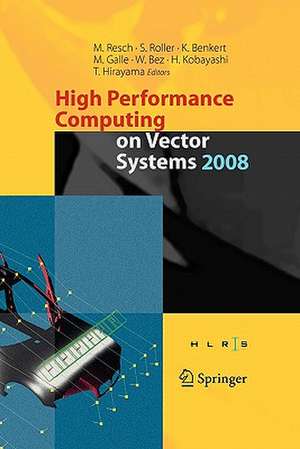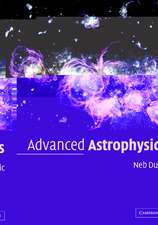High Performance Computing on Vector Systems 2008
Editat de Sabine Roller, Katharina Benkert, Martin Galle, Wolfgang Bez, Hiroaki Kobayashi, Toshio Hirayamaen Limba Engleză Paperback – 18 oct 2010
| Toate formatele și edițiile | Preț | Express |
|---|---|---|
| Paperback (1) | 638.57 lei 6-8 săpt. | |
| Springer Berlin, Heidelberg – 18 oct 2010 | 638.57 lei 6-8 săpt. | |
| Hardback (1) | 645.47 lei 6-8 săpt. | |
| Springer Berlin, Heidelberg – 3 noi 2008 | 645.47 lei 6-8 săpt. |
Preț: 638.57 lei
Preț vechi: 751.25 lei
-15% Nou
Puncte Express: 958
Preț estimativ în valută:
122.19€ • 130.66$ • 101.88£
122.19€ • 130.66$ • 101.88£
Carte tipărită la comandă
Livrare economică 18 aprilie-02 mai
Preluare comenzi: 021 569.72.76
Specificații
ISBN-13: 9783642099410
ISBN-10: 3642099416
Pagini: 256
Ilustrații: XIV, 242 p. 148 illus., 96 illus. in color.
Dimensiuni: 155 x 235 x 13 mm
Greutate: 0.37 kg
Ediția:Softcover reprint of hardcover 1st ed. 2009
Editura: Springer Berlin, Heidelberg
Colecția Springer
Locul publicării:Berlin, Heidelberg, Germany
ISBN-10: 3642099416
Pagini: 256
Ilustrații: XIV, 242 p. 148 illus., 96 illus. in color.
Dimensiuni: 155 x 235 x 13 mm
Greutate: 0.37 kg
Ediția:Softcover reprint of hardcover 1st ed. 2009
Editura: Springer Berlin, Heidelberg
Colecția Springer
Locul publicării:Berlin, Heidelberg, Germany
Public țintă
ResearchDescriere
This book covers the results obtained in the Tera op Workbench project during a four years period from 2004 to 2008. The Tera op Workbench project is a colla- ration betweenthe High PerformanceComputingCenter Stuttgart (HLRS) and NEC Deutschland GmbH (NEC-HPCE) to support users to achieve their research goals using high performance computing. The Tera op Workbench supports users of the HLRS systems to enable and - cilitate leading edge scienti c research. This is achieved by optimizing their codes and improving the process work ow which results from the integration of diff- ent modules into a “hybrid vector system”. The assessment and demonstration of industrial relevance is another goal of the cooperation. The Tera op Workbench project consists of numerous individual codes, grouped together by application area and developed and maintained by researchers or c- mercial organizations. Within the project, several of the codes have shown the ab- ity to reach beyond the TFlop/s threshold of sustained performance. This created the possibility for new science and a deeper understanding of the underlying physics. The papers in this book demonstrate the value of the project for different scienti c areas.
Cuprins
Future Architectures.- First Experiences with NEC SX-9.- Scalable Computing in a Hybrid System Architecture.- Prerequisites for the Productive Usage of Hybrid Systems.- Multiscale and Multiphysics Simulations.- Complex Numerical Simulations in Production Techniques.- Multi-scale and Multi-physics Applications — User Requirements for Future Applications.- Grid Computing & Data Analysis.- An Application of the NAREGI Grid Middleware to a Nationwide Joint-Use Environment for Computing.- Interoperation between Atomic Energy Grid Infrastructure (AEGIS) and Other Grids.- Parallel File Systems in European Grid Projects.- Development of Cognitive Methodology based Data Analysis System.- Chemical Applications.- 3D-Flame Modelling in Power Plant Applications.- Hierarchical Modeling of Combustion Processes.- Understanding Molecular Recognition and Self-Assembly from Large-Scale Numerical Simulations.- Large Scale Particle-in-cell Plasma Simulation.- Multi-scale Modeling of Crack Propagation.- Climate Modeling, Hydro- and Aerodynamics.- The Climate Model ECHAM5 on NEC SX-8.- A Large Spectrum of Free Oceanic Oscillations.- Direct Numerical Simulation of Controlled Shear Flows.- Fluid-Structure Interaction in Turbine Simulation.- Heterogeneous Parallel Aero-Acoustics Using PACX-MPI.- Meandering of Wing-Tip Vortices Interacting with a Cold Jet in the Extended Wake.
Textul de pe ultima copertă
This book presents the state of the art in high-performance computing and simulation on modern supercomputer architectures. It covers trends in hardware and software development in general and specifically the future of vector-based systems and heterogeneous architectures. The application contributions cover computational fluid dynamics, fluid-structure interaction, physics, chemistry, astrophysics, and climate research. Innovative fields like coupled multi-physics or multi-scale simulations are presented. All papers were chosen from presentations given at the seventh Teraflop Workshop, held in November 2007 at Tohoku University, Japan; the eighth Teraflop Workshop, held in April 2008 at the Höchstleistungsrechenzentrum Stuttgart (HLRS), Germany; and at the Japan Atomic Energy Agency in April 2008.
Caracteristici
Includes supplementary material: sn.pub/extras










